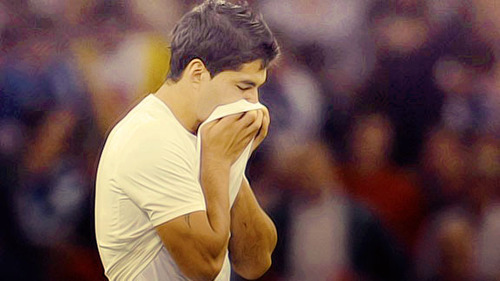On having too much, and Luis Suarez
On having too much, and Luis Suarez


By Max Grieve
The Olympic concept has broken free of any shackles that might have once tied it to some impression of sanity, and is rampaging wildly across East London, the watching world, and the United States on primetime delay. There are the butchers forbidden from fashioning Olympic rings out of links of sausages, but my objection runs beyond them. Where the Games should be an escape; a glorious utopia where for a few weeks the world might forget itself and run 100m together, they have become an extension of normality.
Ideally, we would strip the Olympics of its excess, and the athletes of their clothes, and return the Games to their innocence. We would keep most of the athletic events, as well as wrestling, boxing and equestrian, but we might also find a place for swimming, chariot racing and pankration, a cruel amalgamation of two fighting disciplines in which kicks to the belly are perfectly legal. Any sport which uses small racquets or bats, or uses an inflatable ball, would be consigned to history, or at the very least a future Olympiad. Citius, Altius, Fortius, or “Faster, Higher, Stronger” – this is the Olympic ideal.
There is too much; and it’s all too close to reality. For so many, the Olympics aren’t the pinnacle of their sport, and fail to exist as the mythological zenith that they might otherwise be. All of which leads me to my point: the Olympic Games are not a stage for football.
It was as strains of Orientales, la Patria o la Tumba bled through the boos in Cardiff that I came to decide as much. Luis Suarez must now be familiar with such audible disapproval and contempt as he tours the country with Liverpool. but the abuse – and I use that word with caution given the circumstances – he received as his national anthem played in Cardiff went against the values on which the Olympics of the Modern era were founded. No Olympic sport has the same attached tribalism as football, and in Cardiff it showed. Seemingly, it would be asking too much for many football fans to embrace the spirit of the Games, and suspend any blind hatred.
Both football and the Olympic Games are sporting leviathans that exist in separate worlds for all but two weeks every four years. Football’s narrative is constantly evolving: where Suarez was once a villain for thrusting his hand between Ghana and a World Cup semi-final, his name is now muddied by something altogether different. Yet when he leaves England he’ll be forgotten, and someone else will take his place. It’s an eternal cycle that will continue until the Moon slams into Russia and kick starts the apocalypse, or Zlatan Ibrahimovic decides he’s had enough and eats the universe. When the Olympic circus rolls around, it is too difficult to divorce normality from the wondrous interruption, and Luis Suarez is not simply Uruguayan; rather he is defined by something which he shouldn’t have said and plays for Liverpool, a team which you probably hate.
The Olympics are different; a global event rarely subject to the kind of violent rivalry that so consumes football. The Australians and the British will create a competition of their own; as will the Australians and the New Zealanders, and the Australians and any other nation which dares to challenge them. These, though, are rivalries of a different nature to those seen in football. They are not so much deathly serious as fun, and one of the great characteristics of the Olympic concept. So often the Olympics are about the nation, not the man, and it is for this reason that such competition is able to thrive. Suarez, Neymar or Ryan Giggs aren’t simply representatives of a nation: they are representatives of a club, and a deeper culture as a result.
Football’s problem is that it is too professional. It is a sport that otherwise overshadows the Olympics beyond entrenched rivalry: the World Cup, Champions League and indeed any major domestic league title would almost certainly be regarded as more valuable than an Olympic medal. Lionel Messi might tell the newspapers that he’s dreamt of winning gold, but what he won’t tell you is that he’s also dreamt of going to Antarctica. Running the 100m in 9.69 seconds and having a gold medal draped around his Jamaican neck represents the culmination of a lifetime’s achievements for Usain Bolt. For footballers, the Olympics might serve as an alternative to tours of Asia and the United States.
Alas, I am not Jacques Rogge and, but for a time machine that could take me back to the late Cretaceous, I never will be. Football and the Olympics have a unique history, but each sporting monster has entered a new era of celebrity and status which makes any coming together difficult to comprehend. For now, though, they will persist with their twisted relationship; blindly crashing up against each other as the world watches, shakes its head, and tells the other planets that it’ll never work out.







